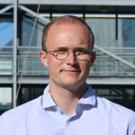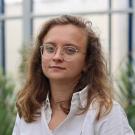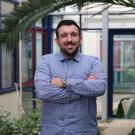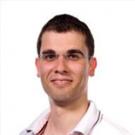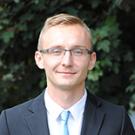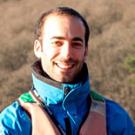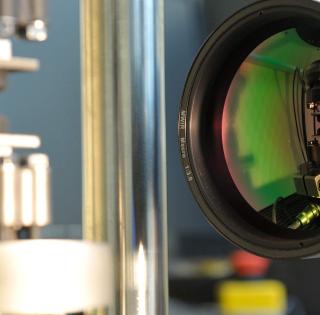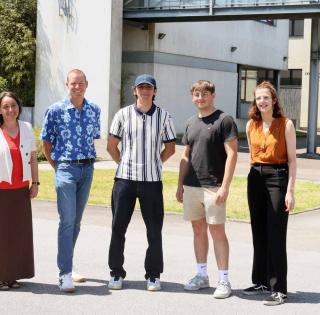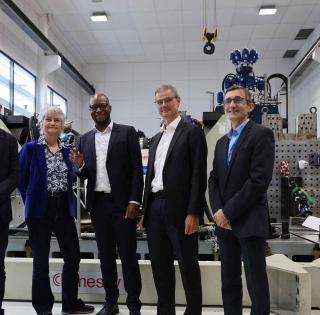
ORGANISING COMMITTEE
GENERAL CHAIR
Pr. A. Mansour ENSTA Bretagne
TECHNICAL CO-CHAIRS
Pr. A. Boudraa Ecole Navale
Dr. D. Dare-Emzivat Ecole Navale
Dr. C. Ioana Grenoble INP
Pr. J. Mars Grenoble INP
Dr. C. Osswald ENSTA Bretagne
IMPORTANT DATES
- Paper Submission: April 18, 2021
- Acceptance Notification: May 16, 2021
- Camera Ready: June 6, 2021
- Author Registration: June 6, 2021
B. Gruselle is a Former colleague of Jean-Yves Le Drian who is a French politician serving as Minister of Europe and Foreign Affairs since 2017. M. Le Drian previously was Minister of Defence from 2012 to 2017 and then he has been nominated by Emmanuel Macron to serve as Foreign Minister since 17 May 2017. In July 2020, chief weapons engineer Bruno Gruselle has been named Director of the École Nationale Supérieure de Techniques Avancées (ENSTA) Bretagne. Former student at ENSTA Bretagne, Bruno Gruselle was notably the head of Industrial Security for the former Strategic Affairs Commission of the French Ministry of Defense from 2003 to 2005. He was then in charge of research at the Strategic Research Foundation, until 2008, then Chargé de Mission for the Délégation à la Prospective et la Stratégie (Strategic Planning and Foresight Directorate), Place Beauvau for the following two years. Having become Head of Research for the Fondation pour la Recherche Stratégique (Strategic Research Foundation), especially on questions of proliferation, Bruno Gruselle was named deputy diplomatic advisor to the office of the Minister of Defense, Jean-Yves Le Drian in 2013. In 2016, he became technical advisor, then industrial affairs advisor in the same office. He joined ENSTA Bretagne as deputy director in June 2017.
Yannick Deville was born in Lyon, France, in 1964. He graduated from the Ecole Nationale Supérieure des Télécommunications de Bretagne (Brest, France) in 1986. He received the D.E.A and Ph.D. degrees, both in Microelectronics, from the University of Grenoble (France), in 1986 and 1989 respectively. From 1986 to 1997, he was a Research Scientist at Philips Research Labs (Limeil, France). His investigations during that period concerned various fields, including GaAs integrated microwave RC active filters, VLSI cache memory architectures and replacement algorithms, neural network algorithms and applications, and nonlinear systems. Since 1997, he has been a Professor at the University of Toulouse (France). From 1997 to 2004, he was with the Acoustics lab of that University. Since 2004, he has been with the Astrophysics lab in Toulouse, which is part of the University and of the French National Center for Scientific Research (CNRS). His current major research interests include signal and image processing (especially hyperspectral data), higher-order statistics, time-frequency analysis, neural networks, quantum entanglement phenomena, and especially Blind Source Separation and Blind Identification methods (including Independent or Sparse Component Analysis and Nonnegative Matrix Factorization) and their applications to Remote Sensing, Astrophysics and Quantum Information Processing.
Arnaud Coatanhay : He is an associate-professor at ENSTA Bretagne since 2001. His research interests are in modeling electromagnetic wave propagation and scattering for radar systems and remote sensing in natural and complex environments.
Authors: R. Scripcaru , C. Ioana, and A. Digulescu
Léonard Caquot is working as a Machine Learning engineer at DGA MI (Direction Génerale de l’Armement, Maîtrise de l’Information, Rennes). He graduated from IMT Atlantique in 2017, where he followed Data Science courses during his last year of studies. His current fields of expertise are deep learning applied to graph structured data, and reinforcement learning in complex scenarios.”
Authors: J.-B. Fraisse, A. Bazin, O.- P. Pasquero
François Delaveau was born in 1964, he received the M.Sc. degrees from Ecole Nationale Supérieure de Techniques Avancées (ENSTA), Paris, France, in 1987, and from Mathematics University (maîtrise Paris VII – 1988 ; succeeded agregation competitive exam – 1990). He always led in parallel various industrial and management skills (marketing support, project manager and head of laboratory...) and research and development activities (studies, models, scientific computation, algorithm conception and implementation), in several domains such as radar and electromagnetism, sonar and submarine acoustic, optronic and lasers, radio communications, random propagation, diffusion and antenna computing.
Since 1997, François Delaveau is one of the Thales SIX experts for Signal Processing and Electronic Warfare of radio communications. He especially worked on advanced RF instrumentation, technical analysis of radio communication signals, smart antennas, passive radar (Thales Awards 2007) and numerous Spectrum Monitoring Communication Intelligence and Electronic Warfare activities relevant to terrestrial, maritime, airborne and satellite radio interfaces. More recently, he developed advanced security schemes for radio cellular networks and wireless local loop (coordinator of the EC-FP7 PHYLAWS project dedicated to Physical Layer Security - web site: http://www.phylaws-ict.org/) and improved Radio Access Technologies for achieving better resilience and more furtivity of radio links when facing complex or hostile radio environments.
François Delaveau is also author or co-author of numerous conferences (ParisTech/COMELEC, EuroSAE, CNAM, etc.), papers and tutorials (IEEE, JSAP, contributions to ITU recommendations and to the Spectrum Monitoring Handbook, Techniques de l’Ingénieur, etc.) and of 30 patents.
Jérôme Gaveau received the engineering diploma degree from Supélec, Gif-sur-Yvette, France, in 2015, and the M.Sc.A. degree in electrical engineering from Polytechnique Montréal, Montreal, Canada, in 2015. This work is part of the PhD that he received, in information theory and telecommunications, from University of Paris-Saclay, in 2018. Since 2018, he has been with DGA, France. His interests include the overlap of artificial intelligence, distributed control, and wireless communications.
Authors: T. Arbi and B. Geller
Author: Y. Rong
Authors: G. Akkad, A. Mansour, B. ElHassan and E. Inaty
Authors: C. Demeslay, R. Gautier, A. Fiche; and G. Burel
Authors: M. Farshouh, J. Srar, and A. Mansour
Ali Mansour received the M.S. in electronic electric engineering from Lebanese University in September 1992, the M.Sc. and Ph.D. degrees in signal, image and speech processing from INPG, Grenoble-France, in July 1993 and January 1997, respectively, and the HDR degree (Habilitation à Diriger des Recherches, this is the highest of the higher degrees in the French system) from UBO, Brest-France, in November 2006. He held many positions such as: Postdoctoral at LTIRF-INPG (Grenoble-France), Researcher at BMC – RIKEN (Nagoya-Japan), Teacher-Researcher position at ENSIETA (Brest-France), Senior Lecturer at ECE Curtin University (Perth-Australia), Invited Professor at ULCO (Calais-France), Professor at Tabuk University (Tabuk-KSA). Actually, he holds a post of Professor at ENSTA-Bretagne (Brest-France). He is interested in Blind Source Separation, High Order Statistics, signal processing, robotics, telecommunication, biomedical engineering, electronic warfare and cognitive radio.
Abdel-Ouahab Boudraa received the B.Sc. degree in Physics from University of Constantine. He also received the M.Sc. degree in Biomedical Engineering from INSA, Lyon, University degree in Nuclear Magnetic Resonance, the Ph.D. degree in Image Processing and the University degrees in Statistics and Modeling and in Positron Emission Tomography all from University of Lyon. He received the accreditation to supervise research from University of Paris-Saclay, Paris. He is currently full Professor of Electrical Engineering at Ecole Navale/Arts & Metiers Institute of Technology. His current research interests include time-frequency, AM-FM modeling, Teager-Kaiser energy operators, Data driven methods, Graph signal processing, anomaly detection in time series, Cyber Security and data fusion. Dr. Boudraa was co-recipient of the Varian Prize 2003, the Norman Miller Award 2019 and was named Chevalier (knight) in the Ordre des Palmes Académiques 2018. Website : https://sites.google.com/view/aboudra
Cornel Ioana received the Dipl.-Eng. degree in electrical engineering from the Romanian Military Technical Academy of Bucharest, Romania, in 1999 and the M.S. degree in telecommunication science and the Ph.D. degree in the electrical engineering field, both from University of Brest-France, in 2001 and 2003, respectively. Between 2003 and 2006, he worked as Researcher in ENSTA-Bretagne, Brest, France. Since 2006, he has been an Associate Professor-Researcher with the Grenoble Institute of Technology/GIPSA-lab. His current research activity deals with the signal processing methods adapted to the natural phenomena. His scientific interests are nonstationary signal processing, natural process characterization, underwater systems, distributed sensing and artificial intelligences approaches applied to the surveillance of power systems and natural environments. WebSite : http://www.gipsa-lab.grenoble-inp.fr/~cornel.ioana/index.html
Authors: A.- H. El Fawal, A. Mansour, M. Najem, A. Nasser and S. Shamaa
Authors: M. Mroue, A. Nasser, B. Parrein, E.-M. Cruz
Authors: D. Abeza, A. Mansour, C. Osswald, A. Boudraa, C. Ioana, A. Digulescu-Popescu
Authors: A. S. Alatawi and M. Ammad Uddin
Yannick Deville was born in Lyon, France, in 1964. He graduated from the Ecole Nationale Supérieure des Télécommunications de Bretagne (Brest, France) in 1986. He received the D.E.A and Ph.D. degrees, both in Microelectronics, from the University of Grenoble (France), in 1986 and 1989 respectively. From 1986 to 1997, he was a Research Scientist at Philips Research Labs (Limeil, France). His investigations during that period concerned various fields, including GaAs integrated microwave RC active filters, VLSI cache memory architectures and replacement algorithms, neural network algorithms and applications, and nonlinear systems. Since 1997, he has been a Professor at the University of Toulouse (France). From 1997 to 2004, he was with the Acoustics lab of that University. Since 2004, he has been with the Astrophysics lab in Toulouse, which is part of the University and of the French National Center for Scientific Research (CNRS). His current major research interests include signal and image processing (especially hyperspectral data), higher-order statistics, time-frequency analysis, neural networks, quantum entanglement phenomena, and especially Blind Source Separation and Blind Identification methods (including Independent or Sparse Component Analysis and Nonnegative Matrix Factorization) and their applications to Remote Sensing, Astrophysics and Quantum Information Processing.
Ali Mansour received the M.S. in electronic electric engineering from Lebanese University in September 1992, the M.Sc. and Ph.D. degrees in signal, image and speech processing from INPG, Grenoble-France, in July 1993 and January 1997, respectively, and the HDR degree (Habilitation à Diriger des Recherches, this is the highest of the higher degrees in the French system) from UBO, Brest-France, in November 2006. He held many positions such as: Postdoctoral at LTIRF-INPG (Grenoble-France), Researcher at BMC – RIKEN (Nagoya-Japan), Teacher-Researcher position at ENSIETA (Brest-France), Senior Lecturer at ECE Curtin University (Perth-Australia), Invited Professor at ULCO (Calais-France), Professor at Tabuk University (Tabuk-KSA). Actually, he holds a post of Professor at ENSTA-Bretagne (Brest-France).
He published numerous refereed publications, he is the author and co-author of several books or book chapters. During his career, he had successfully supervised several research associates and PhD and MSc students. He is a senior member of IEEE and was the vice president for IEEE signal processing society in Western Australia for two years. He had also been the lead guest editor for the EURASIP Journal on Advances in Signal Processing. He is interested in Blind Source Separation, High Order Statistics, signal processing, robotics, telecommunication, biomedical engineering, electronic warfare and cognitive radio.
Experiments will be performed by: D. Abeza and Y. Dongue
Participants will learn how to do essential simulations using PSPICE. This laboratory will be supervised by A. Mansour.
Spice (Simulation Package with integrated Circuit Emphasis) developed in the university of California, Berkeley campus, by Electrical Engineers in 1970’s.
It is accepted and used widely by the electronic industry and academic institutions
PSPICE is based on SPICE (VERSION 2G6) and written for IBM-PC environment, developed by MicroSim Corp USA










